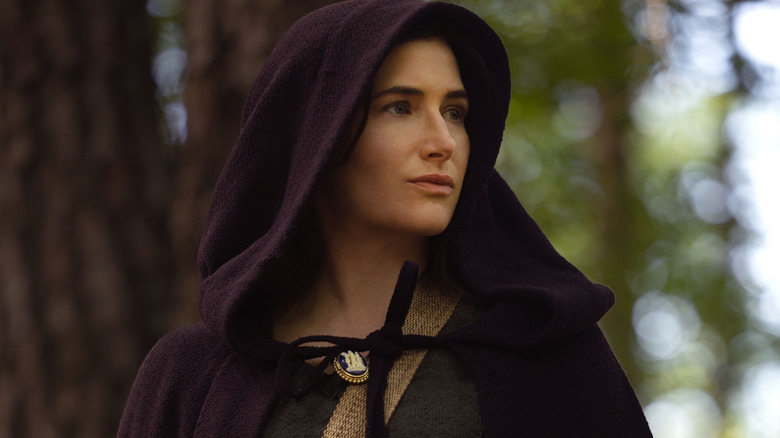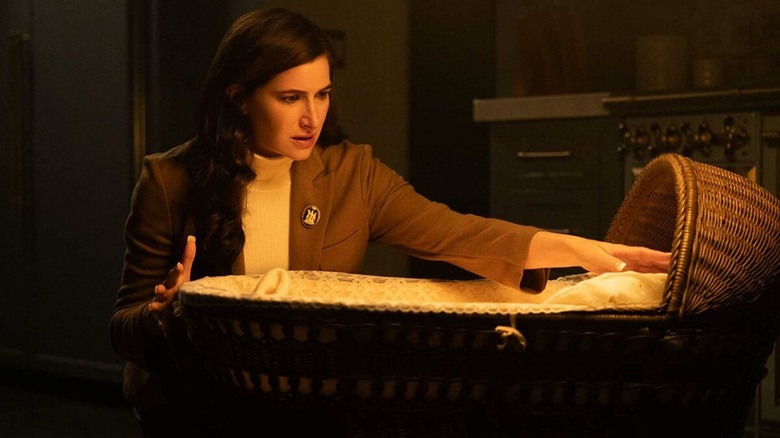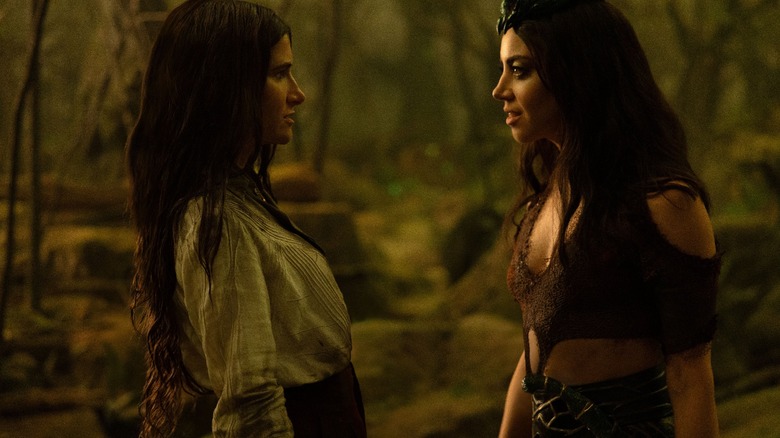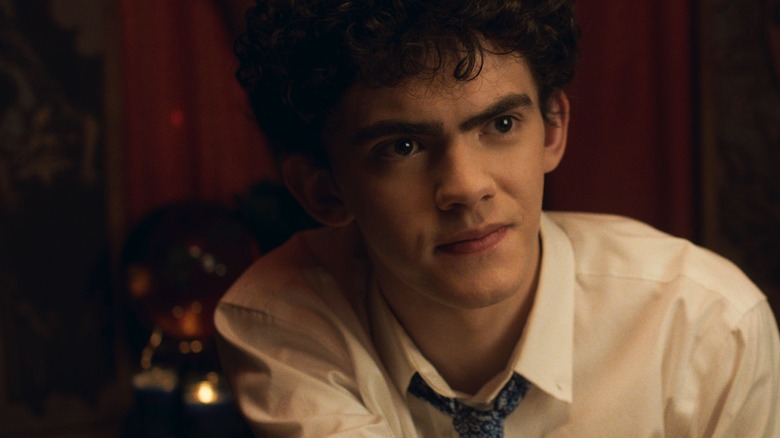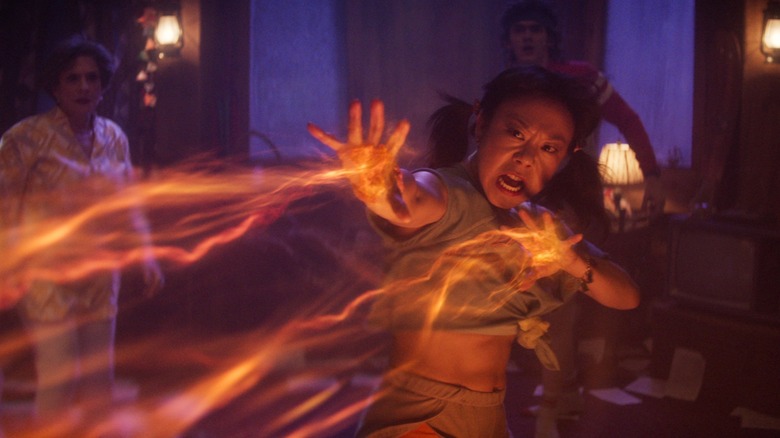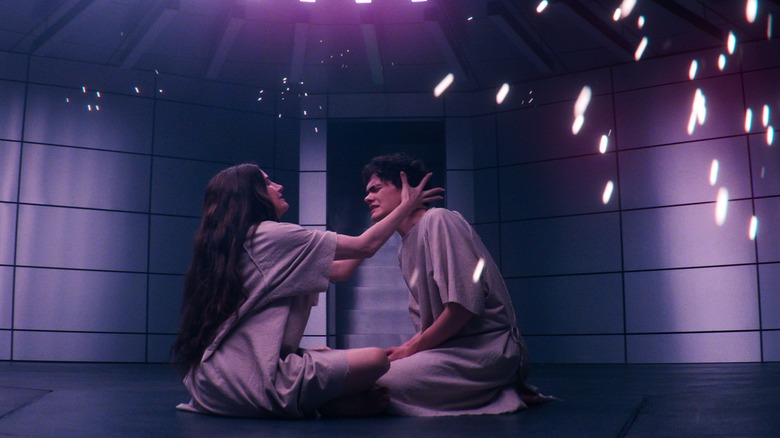The Ending Of Marvel's Agatha All Along Explained
This post contains spoilers for Marvel's "Agatha All Along."
It was expected that "Agatha All Along" would stay true to its title by including a "WandaVision"-esque reveal about her true intentions, but episodes 8 and 9 of the show accomplish this impressively by recontextualizing everything. The core impetus for our beloved characters in the show — the Witches' Road — is exposed as a scam spun by a desperate, power-hungry Agatha (Kathryn Hahn), whose lies have cost innumerable lives over centuries. This startling reveal doesn't necessarily alter our foundational understanding of Agatha, though: she is still a villainous character, only now furnished with enough context for us to comprehend her worldview and why she tends to be so trigger-happy. The series also ends with a major death, but the repercussions are far from traditional, and they set up a fresh phase for the near future of the Marvel Cinematic Universe.
Death is an integral aspect of "Agatha All Along," as Agatha covertly pulls the strings of fate in her favor while working closely with Rio (Aubrey Plaza), who is none other than Lady Death. Although Agatha and Rio share a complicated, contentious relationship, there was a lot of love between them at one point, and in the finale we finally get to see the reason why it soured over the centuries. The confrontation between Agatha and Rio, interrupted swiftly by a fully powered-up Billy/Wiccan (Joe Locke), is less flashy and more emotion-driven, and ends in willing surrender instead of defeat. Then, "Agatha All Along" uses an unconventional flashback-heavy final episode to wrap things up, revealing the truth about Agatha's son, Nicholas Scratch, and his role in the origin of the Witches' Road.
Everything can be traced back to Nicholas Scratch
The "Agatha All Along" series finale, titled "Maiden Mother Crone" accomplishes two things: it fills in necessary gaps about Agatha's elusive past and allows the truth revealed to dissolve the web of deceit surrounding the present. At the end of episode 8, we see a traumatized Billy return home to his parents. As he settles down in his room, which is impeccably decorated with pieces of occult pop culture, Billy stumbles upon a horrific realization: he created the Witches' Road.
Like the skewed sitcom versions of Westview that Wanda created in "WandaVision," the Witches' Road was a manifestation of Billy's psyche. The aesthetics of the realm and its trials were created from his pop culture-infused views of witchcraft, along with his traditional understanding of tarot, spellwork, and chaos magic. This is not too surprisiing once we acknowledge his lineage — he is the son of the Scarlet Witch, after all — but it's a twist that almost no one saw coming.
Nicholas Scratch has been namedropped throughout the show, with rumors circulating about Agatha trading her son for the Darkhold, which manifests as a hallucination during the first trial. This vision seems like a red herring in hindsight (unless the Darkhold is meant to represent Agatha's limitless hunger for power), as flashbacks reveal that Nicholas was fated to die as soon as he was born. Agatha, being Death's lover, begged her for mercy. Rio graciously extended Nicholas' lifeline, with a warning that she would have no choice but to return one day.
Dreading this inevitable demise, Agatha starts siphoning power from other witches and killing them in the process. Agatha's dastardly actions were most likely meant to appease Death: offerings strewn over the years to delay the inevitable and to spend more time with Nicky. But as Rio states, Death comes for all.
Agatha's hunger for power eclipses her grief over Nicholas
It is hard not to empathize with Agatha when she's seen doting on her son or crafting together an innocent little ballad about going on a journey with a loved one. After all, Nicholas is her child born "from scratch," – a miracle she happens to love more than anything in this world, and losing him robs her of every vestige of kindness left inside her. However, it is important to acknowledge that Agatha has always been the kind of person to justify the deaths of countless innocents if it helps accomplish goals fruitful for her. In this case, she kills many witches to keep garnering power and appeasing Death with bodies to keep her away from Nicholas. After Nicholas dies, Agatha spreads lies about the fictional Witches' Road to lure other witches to her, then kills them to amass power with no end.
What began as a sweet, endearing ballad between a mother and her child was willfully twisted by Agatha into a death trap even when Nicholas was alive, as she often used his sickly countenance to lure concerned witches to their doom. Nicholas questions her motivations at one point, asking why they couldn't simply co-exist with covens and protect one another instead of going on killing sprees without rhyme or reason. In response, he is met with a worldview often wielded by those jilted and corrupted beyond repair: everyone is poised to betray you, so you must strike first to protect yourself. Although Nicholas does not seem too convinced, he's too young to understand the paranoia-infused instinct for cruelty that Agatha passes off as self-preservation.
Of course, Agatha's knee-jerk instinct to hurt others or covet without thought does not exist in a vacuum. She was a victim herself, subjected to cruelty by her mother Evanora, which twisted her perception of motherhood and covenhood over time. However, at some point, her trauma and grief morphed into gleeful cruelty: Agatha Harkness became acutely self-aware of her penchant for murder and the need to possess what does not belong to her.
Enter Billy Maximoff, the most powerful magical wild card
Agatha's imprisonment in Westview robs her of her true memories or powers, but Rio is quick to intervene and remind her who she is. However, the unexpected arrival of Billy Kaplan/Maximoff alters the natural course of Agatha's plans, as no one, not even Death, could anticipate the fact that Billy would jump bodies and be able to give himself a second chance at life. Moreover, the sigil imposed by Lilia (Patti LuPone) prevents Agatha and the others from learning his true identity, which further solidifies their assumption that he is simply a teenager who got roped into Agatha's schemes.
When Billy proposes the Witches' Road to Agatha at the start of the series, she looks taken aback, but now we understand the full extent of her reaction. The Road is her gimmick, a gross fabrication she has profited from for years. Billy's proposal provides her with the perfect setup to regain her abilities during the summoning ritual.
However, when the Road actually manifests for the first time after the summoning, and the coven refuses to fall for Agatha's bait, the scales of power gradually shift; Agatha is no longer in control of her own con. The Road was never real to begin with, but Billy's chaos magic helps create a realm rife with trials and boons, furnished with his interpretations of what a craft-infused witches' journey would look and feel like. This is also the reason why Agatha is so quick to figure out that Billy is the Scarlet Witch's son. She knows that the only way a non-existent realm can be brought to life is through some really powerful chaos magic, even if the act itself is unintentional.
Despite her efforts to stay detached, Agatha perceives Billy through the lens of affection she has for Nicholas, creating volatile emotions. While Agatha finds Billy's belief in her goodness endearing, she is aware that it is a naive sentiment that only a child could harbor.
The deaths on the Witches' Road
Throughout the show, the consequences for Agatha's sins are dangled in our faces — be it in the form of Rio, the Salem Seven, a whole Mephisto namedrop, or the return of her mother in spirit form. However, Agatha manages to evade every one of these threats that intend to harm or limit her, with someone innocent taking the fall on her behalf and dying in cruel, heartbreaking ways.
Agatha's reluctance to face Rio compels her to recruit Mrs. Sharon Davis (Debra Jo Rupp) as their "green witch." Sharon is the first member of the coven to die, because she is not a good fit for the realm's expectations. Alice (Ali Ahn) stays true to her protection witch instincts and dies shielding Agatha, who cruelly siphons her powers and kills her with little remorse. Lilia, the most thoughtful among the coven, willingly sacrifices herself to kill the Salem Seven. Finally, Jen (Sasheer Zamata) learns that Agatha was the one to bound her for years, and forcibly unbinds herself to regain her powers, completing her journey in the process.
Except for Jen, who takes matters into her own hands to rightfully snatch back her powers, every instance where Agatha is meant to suffer for her sins is transposed onto another, helping her evade consequences. As the Witches' Road does not have a will of its own and is an extension of Billy's psyche, he blames himself for the deaths he unwittingly caused — though, as Agatha points out, she would have murdered them all anyway if the Road hadn't appeared. Even in death, Agatha manages to evade Rio and retains a spirit form to help her avoid the afterlife. The decision to end her own life might have partly been inspired by her need to protect Billy, but this is Agatha we are talking about: everything she does has an ulterior motive.
By sacrificing herself, Agatha fulfills her deal with Rio by technically embracing death, but refuses to be ferried to the afterlife like Alice or Lilia. Now that she's back by Billy's side, what exactly is the chaos witch scheming?
Tommy Shepherd and the start of a new era
Agatha's deepest emotional ties are to Nicholas, as exemplified by her act of creating a new life with the dandelion seed inside her brooch (which also stores a lock of his hair). This is an act of creation that ensures that Nicholas' innocent spirit lives on. It is also an act of green witchcraft, traditionally associated with nourishing and healing, which are parts that Agatha has completely shunned by embracing chaos. Even back when Nicholas was alive, Agatha was unable to nourish or heal him using magic; her only way to take care of her child was to leave behind a trail of death to appease an entity destined to claim his life. Although she passes the final trial, her heart remains mostly unchanged — except for a budding soft spot for Billy, who reminds her of Nicholas' innocence.
It's unclear as to why Agatha is suddenly interested in helping Billy out, but his reluctance to banish her creates a coven of two who can work together to find his brother, Tommy. During the final trial, Billy was able to help Tommy jump into the body of a teenager at the point of death, just like Billy himself once did. In Tommy's case, his new host body is a boy who was drowned in a swimming pool as the result of a cruel prank. Now, Billy must search for his brother without knowing whether he remembers his past. This overtly sets up the existence of Tommy Shepherd AKA Speed in the Marvel Cinematic Universe, and the eventual introduction of the Young Avengers somewhere down the line. However, it's tough to anticipate the role Agatha might end up playing in Billy's future arc, or whether her spirit form will be any different from her corporeal one.
If we view the events in "Agatha All Along" on a macrocosmic level, it is clearly a tragedy of the highest order: several innocents have died because of one person who has gotten away with it in every sense of the word. If anything, Agatha seems to have been rewarded with a cop-out form of existence that does not demand repentance or accountability, and allows her to exist and pull the strings without the limits that a physical body can impose. After all, hers is the face of a complex, enduring evil that finds a way to persevere and present its schemes as benign until it is time to reveal the truth. The true terror has been Agatha all along.
